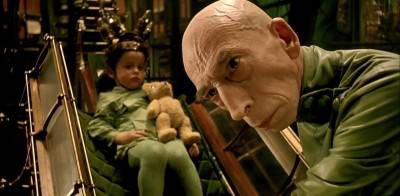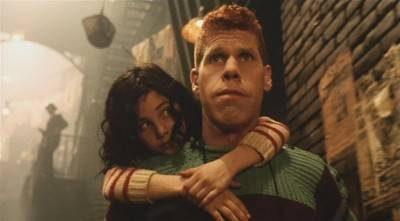La cité des enfants perdus (The City of Lost Children) (1995)
R
The City of Lost Children is a visual indulgence that will have you captivated and feeling uneasy. Directors Marc Caro and Jean-Pierre Jeunet teamed up with other key players from the films Delicatessen (1991) and Amélie (2001) to create a unique post-apocalyptic fairy-tale experience.
If you’ve seen either of those other two films, then you have an idea of the look and feel that you should expect.I couldn’t look away during the opening dream/nightmare sequence. It was disturbing and unsettling, while being completely entrancing at the same time. I had to get used to it because a lot of the film is that way. It’s a bit difficult to take notes when a film demands such great attention to the dialogue (subtitled and not dubbed, thankfully) and its enduring beauty. Every shot looks like art. Everything about it: the camera angles, colors, framing, writing, costumes, lighting make it a beautiful work.

The film starts innocently enough, with great anticipation for Santa to come down the chimney to visit a suspecting young boy. But things quickly turn for the worse as a gaggle of Santas fill the little boy’s room and the dream builds into a jarring nightmare, complete with screams. Things are just getting started.
 The story hinges on Krank, a soul-less, mad-scientist monster who is unable to dream. Everything about him is artificial, including his wife and his kids. His solution is to kidnap little ones around the city and try to steal their dreams. He wants to feel and live outside of himself. He wants to feel young. His search is extensive because the kids fear him and their dreams quickly become nightmares. As Krank’s wife, Mademoiselle Bismuth (Mireille Mossé), tells him, “Maybe the children give you nightmares because the evil is in you.”
The story hinges on Krank, a soul-less, mad-scientist monster who is unable to dream. Everything about him is artificial, including his wife and his kids. His solution is to kidnap little ones around the city and try to steal their dreams. He wants to feel and live outside of himself. He wants to feel young. His search is extensive because the kids fear him and their dreams quickly become nightmares. As Krank’s wife, Mademoiselle Bismuth (Mireille Mossé), tells him, “Maybe the children give you nightmares because the evil is in you.”
Daniel Emilfork (Krank) and Dominique Pinon (clones) are both superb. Emilfork is just frightening in general and doesn’t have to do much to play up the bizarre nature of his devilish character. No wonder the kids have nightmares. Pinon has the flexibility to add variety to a set of clones, making them slightly and not-so-slightly (you’ll have to see it for yourself to figure that one out) distinguishable from one another.

Ron Perlman (One) and Judith Vittet (Miette) are the core of the film. Perlman plays One, a big, “but not grown up,” dumb, circus freak strongman. I’m sure I’ve seen Perlman in more things than I can recall, but I don’t usually remember his performance. He has done a lot of voice work in his career and is easily remembered as Vincent in the Beauty and the Beast TV series (1987-1990) and Hellboy (2004), of course. But this was a different, lighter side for him (note: this is actually his first lead role). And he even learned and delivered all of the French flawlessly. He is memorable and impressive. One has a sweet, loving nature and a soft spot for children. His scenes with Miette are tender and heartfelt. He’s the perfect foil to the destructive dastardliness of Krank. He cares for Miette like he would for a little sister. Even though Miette is fiery, stubborn, smart and mature for a young girl, she still needs One around to protect her from evil at all costs.
Just like Amélie, the color green is everywhere in the film and it pops off the screen. Both films have great color, contrast and saturation, but this film just does it in a darker, more sinister way. According to IMDB, the altered color scheme was achieved by painting the actors’ faces white and then correcting the color palette until they became flesh-toned. The City of Lost Children is a dream and a nightmare all wrapped into one. One man’s dream is another one’s nightmare, I suppose. It’s a stunning and earnest film and, from my movie seat, “sincerity always wins.” See it on the big screen in 35mm while you can.
I give it four stars.
The City of Lost Children plays at the Art Theater on Sunday at 8:30 p.m. and Thursday at 10:30 p.m.








